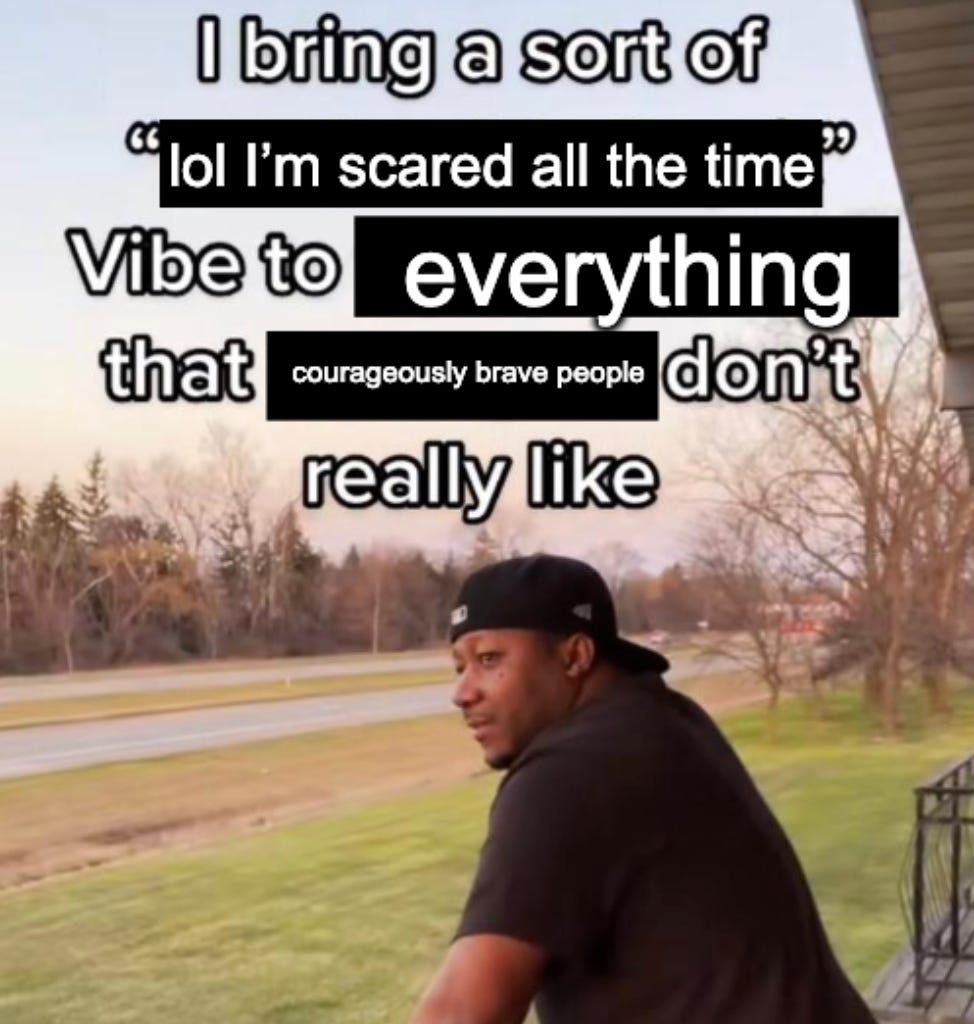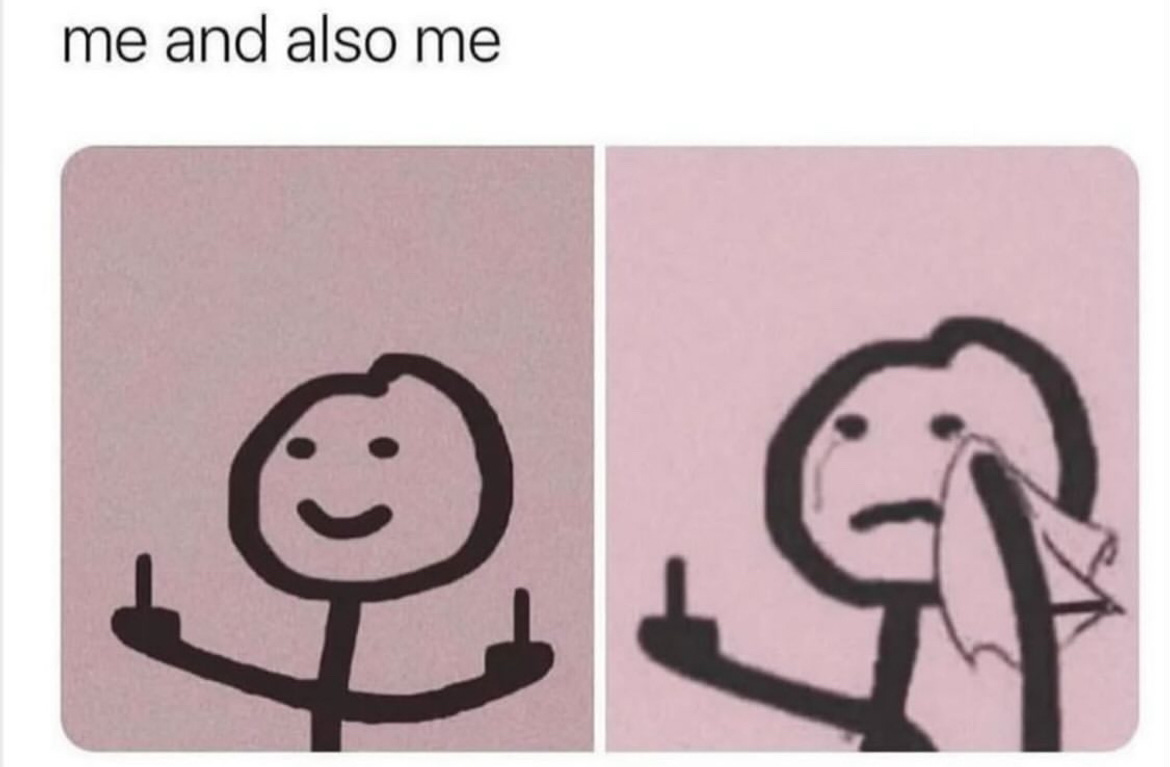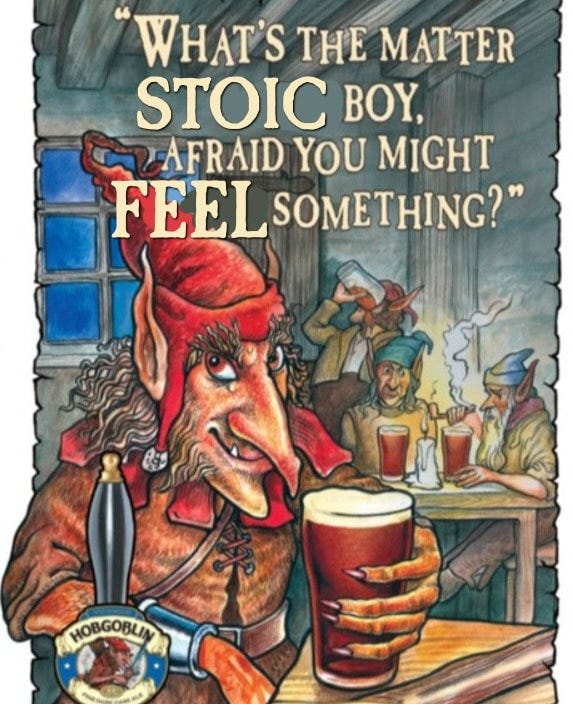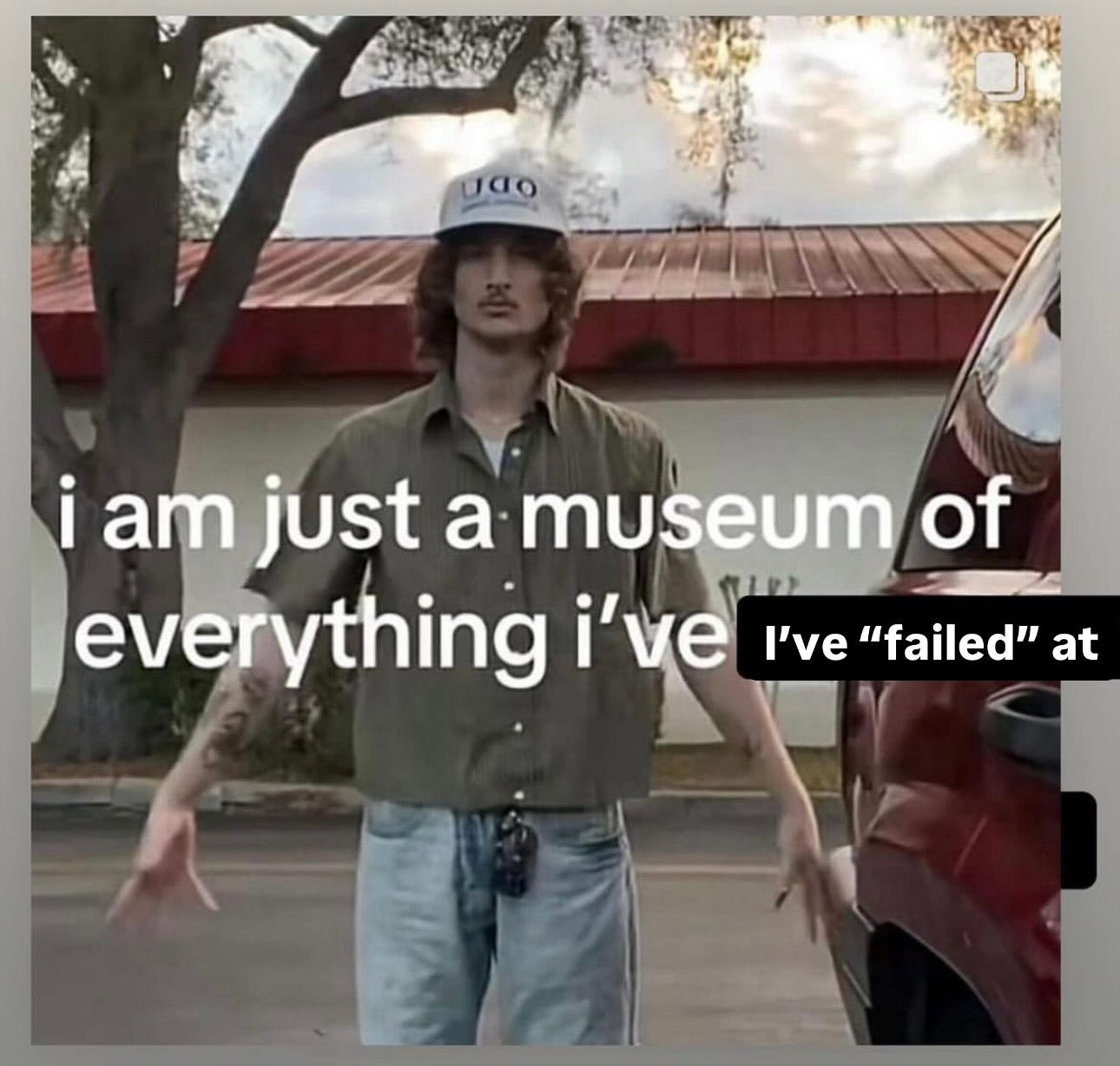failure tolerance vs. failure aversion, and what it has to do with contagious magnetic energy
"the only people who never feel discomfort for having made fools of themselves are, you guessed it, dead."
This is the third post in a six-week series on Failure Tolerance as a Magnetic Practice. If you want access to the full curriculum for this series, subscribe to The Twelfth House.
My inner hater goes rabid when I read about an event that centers “courageous conversations” in a “brave space” for two reasons:
I think that language is corny as hell
I bring a sort of “lol I’m scared all the time” vibe to the function that courageously brave people really don’t like
What can I say? If my lil’ heart is a-beating, there’s a good chance it’s pumping fear through my veins. My scaredy cat-ness is probably my most authentic personality trait1. I’m 36 and if I find myself sleeping in a room that doesn’t have a bedside table, I’ll sprint and jump onto the bed the second I flick the lights off2. And TRUST ME, I know my existential fear is not attractive or cute; it is tiresome and annoying for everyone involved!
To counter this deeply unattractive quality, people like me learn to perform a simulacrum of bravery. You, scared? Never! Nothing bothers you! You're not intimidated! You're the mythical "cool girl" from Gone Girl, definitely not someone who breaks out into nervous sweat while trying to figure out if you're already muted on this Zoom call or if everyone just heard you whisper "fuck this meeting" to your cat.
The Brave Vulnerable Courage Mama Mafia™️ would have you believe that the only way to become ✨the best version of yourself ✨ is to confront your fear and hiss in its face like the fierce warrior diva you are until you’re no longer scared. Fake-it-til-you-make-it vibes.
Unfortunately, I discovered I am not a fierce warrior diva after attempting to strong-arm myself into courage and instead developing an eye twitch and a seizure disorder3. And you know what? That’s fine! Because when you’re fresh out of fearlessness, failure tolerance will do just fine.
I’m an inherently fearful person who seems like a brave person because I’ve had no choice but to develop a high failure tolerance ¯\_(ツ)_/¯
Two households, both alike in dignity (kinda)
Very few of us learn failure tolerance. Almost everyone is taught to abide by failure aversion, and trained to avoid anything that might result in an embarrassing story our relatives tell every year at Thanksgiving until we die4.
The difference between these states is outwardly subtle but atomically different:
Failure aversion is the avoidance of experiencing perceived rejection or failure.
Failure aversion is only watching shows that Netflix's algorithm already knows you'll like, or dating someone who functions primarily as human wallpaper in your life. It's the spiritual opposite of shoot-your-shot culture — more like bury-your-shot-in-the-backyard-at-midnight-so-nobody-sees culture.
Failure tolerance is the capacity to withstand and recover from perceived rejection or failure.
Improving your failure tolerance by, like, one percentage point will make you relentlessly magnetic to Nice and Good things. To people, to magic, to opportunities, to love, to aligned clients, to animals, to synchronicities, to intuition, to art, to angels, to friendships, to nature.
Babies and puppies will beeline to you in a crowd. Baristas will always throw in a free cookie with your latte order, just because. Things that seemed impossible become routine. The universe starts slipping you extra lives while it whispers conspiratorially, “You’ve always been one of my favorites.”
That’s just what happens when you turn up to eleven on the failure tolerance scale. Your life globally improves, and quickly, because the more you fail consciously and intelligently, the quicker you’ll learn. The faster you learn, the faster you get what you want.
Why We Default to Failure Aversion
If it’s sOoOoOo GrEaT why aren’t we talking about failure tolerance every day? Welp, cause it’s kind of the polar opposite of failure aversion, and to avoid failure is our default setting5.
Failure aversion is evolutionary; we avoid doing things we’re not good at, because in some cases it is actually life-threatening to fail — like if you get thrown in a river and can’t swim, or try to outrun a hungry lion, or attempt to merge onto the 110 freeway in Los Angeles without basic competence — your failure becomes your obituary.(RIP to u, ur dead now).
But most of the time failure is as life-threatening as a strongly worded email … even though somatically and emotionally it might feel like you're locked in a danse macabre with Hades himself.
(Think about how your heart starts galloping in your chest while you work up the courage to ask your boss for a raise, a conversation that has approximately the same survival risk as ordering a slightly complicated coffee during the morning pre-office rush. Menacing, and for what???)
When you find yourself in a position in which you might not get the outcome you’re hoping for — which you perceive as failure — your body says, BABY YOU’RE DYING, CUT THAT OUT!
We avoid failure because we are avoiding the feeling of dying.
Sad Beige Failure Aversion Life
To avoid that imminent demise feeling, we stick to actions and situations where we're fairly certain of a positive outcome. Being failure averse might look like:
A preference to work by yourself because you don’t like relying on other people and know you can do a good job (even if it means you're basically a one-person sweatshop running on caffeine and spite)
Being dedicated to a very specific and detailed wellness practice you follow to a T
Not asking questions where the answer might be “no” from clients, friends, customers, collaborators, advisors, etc.
Finding that you’re good at everything you try… 🚩🚩🚩Which is statistically impossible unless you've carefully curated a life with the narrow range of activities of a Victorian debutante who's only allowed to play the pianoforte and embroider handkerchiefs and die of consumption before 30
Staying in a relationship that’s more “meh” than [Usher voice] “YEAH!”
Creating situations where you know you’ll succeed, like like entering your dog in the "owner's-best-friend" category at the local dog show when you're the only judge
Failure aversion isn't the worst strategy.
It leads to the kind of life where they'll definitely spell your name right on your tombstone, but your eulogy will have all the compelling narrative tension of an airline safety pamphlet. You'll be remembered as someone who “usually showed up on time" and "never caused problems" — what people say when they can't think of anything interesting about you. Like saying, "My favorite thing about the movie is, like, it feels like a movie.”
How to Build Your Failure Tolerance
Perhaps you’d prefer to be someone with massive energetic gravitational pull and you would like to feel like you’re actually living your life, not just avoiding the dying feeling. In that case, it’s time to increase your failure tolerance.
First, be real: If you had to rate your failure tolerance on a scale of 1 to 10, 1 being “I’d literally rather die than fail,” and 10 being “I just asked someone out a second ago and they said no and I’m totally fine!”…. where are you? 6
Great, that’s your baseline. We’re going to try and move the dial up 3, maybe 4 points and see what happens.
How? Well, it’s pretty simple: Start putting yourself in the position to fail at least once a day.
This sounds awful (it is). You’ll feel like you’re dying (you’re not).
Building failure tolerance is like developing an emotional immune system that doesn't collapse at the first sign of a "no." It requires intentionally exposing yourself to small, controlled rejections until your brain finally realizes that rejection is not, in fact, a terminal diagnosis.
And once you're okay with people telling you "no," you’re free to ask for whatever you want. Your brain will begin to think differently, and you'll realize you unconsciously dismissed your own desires because they had a high likelihood of failure.
Slowly, you’ll learn that the possibility of failure is way more painful than actual failure.
Your imagination has you catastrophizing all the things your old boss could say if you ask for a LinkedIn recommendation, when the likelihood of those scenarios is microscopically small. Worst case scenario? They reply, "lol, no 🤍"
You’ll also start to see you’ve categorized “failure” all wrong. You can’t get to the yeses without going through the nos. Failure is a mandatory prerequisite to success.
I often remind my clients that the average conversion rate on a sales page on the internet is ~2%. That means if 100 people enter your web store, two people will ultimately purchase. 98 people had to say no. If you’re failure averse, a 98% rejection rate is an absolutely brutal concept — enough to make you want to preemptively cower in the fetal position before you ever begin.
Even in a brick and mortar store, the average conversion rate is ~20%. Eight out of ten people will look you dead in the eye, fondle your merchandise like they're appraising the Crown Jewels, and then say, Thaaaaaaaaanks but I'm just looking when you've been watching them browse for 45 minutes. But two people will say, Fantastic, I'll take 47 and do you gift wrap?
If we personalize our failures, we make them existential — “my very existence is a failure” — rather than tactical — “this specific approach failed.”
It's not that you "failed," it's that your sales tactic didn't work with that particular person who, for all you know, just got diagnosed with a mystery illness or is going through a divorce or just realized their entire retirement fund is invested in cryptocurrency. That's fixable. Your strategy failed, not your soul.
Apathy is the disease, embracing failure is the cure
Collect rejections like it’s 1999 you’re building out your Beanie Baby portfolio. Scoop ‘em up and display them proudly.
Examples of daily failures to collect:
Ask the barista if they could throw in a free muffin with your order (the point is not the muffin, the point is to not be afraid to ask and not to have a mental breakdown if they say no)
Buy tickets to a show and invite someone you don’t normally text first
Send a pitch email or seven
If you see someone interesting out in the world, start up a conversation and ask them about themselves (I’m not kidding, this is almost always a portal to your life improving in some way)
Take on a hobby you’re not good at. Keep doing it. Laugh about it.
Actively promote and sell something in your business every day. Bonus points: Sell in a way you’re not used to, like over email or via IG stories or by doing in-person outreach.
The first few times you deliberately put yourself in situations where you might fail, your body will react like you're starring in a horror film.
Your heart will pound, your palms will sweat, and your brain will helpfully suggest, "perhaps we should just melt into an Alex Mack puddle and ooze away through the nearest air vent rather than face the possibility that the cute person at the farmer's market doesn't want to discuss heirloom tomato varieties with you.”
But you won’t die! And your body and mind will learn that failure isn’t the enemy — it’s an alchemical experience.
The Three Transformations
Here's the magic that happens when you start treating failure like a game rather than a heat-seeking missile aimed at obliterating your self-worth:
First, your world expands. When you're failure averse, you unconsciously build fortress walls around your life. Everything becomes "not for me" — that writing workshop, that dating app, that conversation with the person wearing Vibram toe shoes at your local wine bar. When you start playing with failure, those walls dissolve. The entire landscape of your life expands.
Second, you become genuinely more interesting. Not in that manufactured "I'm so *~*quirk¥ ~" way, but in that deeply magnetic "this person has lived some life" way. Embracing flaws and mistakes is what separates humans from algorithms.
Third, you develop a relationship with the universe that's so suspiciously charmed it would get you burned as a witch in earlier centuries. When you're no longer paralyzed by rejection, opportunities start appearing with the regularity of celebrity beauty brand launches. The impossible email gets answered. The job you're "not qualified for" becomes yours. The person you thought was out of your league suggests getting dinner. The universe starts dropping gifts in your lap like you've been its favorite all along but it was just waiting for you to notice.
I'm not claiming you'll transform into a psychologically perfect, ultra-confident superhero who never experiences embarrassment or shame or fear. You’ll still have moments of bone-chilling self-cringe. That’s just called livin’, honeybee.7
I’m just saying you don’t have to worry about finally overcoming all your fears and becoming a “brave” person in order to live a life that delights you. Instead, become a dedicated collector of fascinating failures. Like a Victorian naturalist with their specimens of exotic beetles, proudly acquire rejection emails, awkward attempts, and not-quite-right tries.
The world doesn't reward the flawless — it rewards the fascinating. And nothing — absolutely nothing! — makes you more fascinating than the emotional scar tissue you've earned by trying, failing spectacularly, and still showing up the next day.
Liked this?
You’ll love Holisticism and our podcast The Twelfth House.
Want to learn more about intuitive business and creator-ship?
Sign up for the North Node waitlist here.
Into my persnickety personality and strategic perspective?
Inquire about 1:1 advising with me here.
Trust me, I’ve tried to ctrl + alt + delete this program from my psyche in a thousand and one ways, but nevertheless, it persists.
Monsters under the bed can’t catch me, I’m fast as fuck, boiiiii
I wish I was kidding, certified epileptic over here babyyyyyy!
… of shame, probably
There’s nothing all that wrong with being failure averse, tbh. Really and truly, I think we go through periods of our lives where we’re more failure averse, and life can still be wonderful. That said, I think there’s a false correlation between failure aversion and stability or safety. Just because you’re avoiding failure doesn’t make your life less dramatic or chaotic. Embracing failure tolerance has made my life more peaceful, not less.
On a good day my set point is like a 7-8, on a regular day it’s more like a 5, and in moments of personal upheaval my failure tolerance set point probably closer to a 2 or 3. I find I’m less emotionally agile when I’m going through ✨something✨. That seems reasonable to me. I have to push myself to be more failure tolerant during those times, but only if I think flexing my failure tolerance will be generative or helpful to my self-perception.
A quote from one of my favorite books, Emotional Agility by Susan David: “When we say, ‘I don’t want to fail’, ‘I don’t want to embarrass myself’, ‘I don’t want to get hurt’, we’re expressing what I call dead people’s goals. That’s because the only people who never feel discomfort for having made fools of themselves are, you guessed it, dead.“













Currently recovering from failure. The failure and full disconnect was hard to swallow at first but now it feels like the possibilities are limitless. And it’s hard to not see and admire all the things I learned along the way.
This is timely. I’m on it! ;) Thank you for writing this.